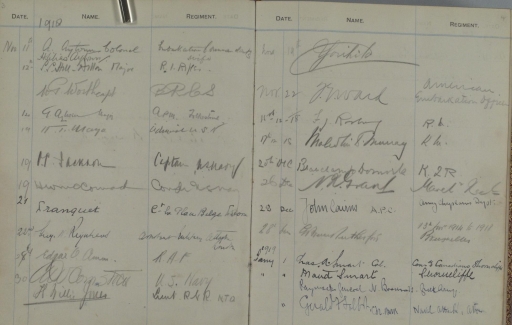Step Short has developed an online collection of 42,000 names of soldiers, nurses and other individuals who passed through the town on their way to the Western Front between 1914 and 1919.
Step Short – based in Folkestone – is a charity marking the Centenary of the First World War.
Folkestone was a major departure point for British and Commonwealth troops destined for the Western Front during the First World War.
From camps nearby and from its railway stations, troops would march down Slope Road, today re-named the Road of Remembrance, to the harbour.
Weighed down with rifle, helmet and kit, soldiers were given the order to ‘step short’ as they negotiated the gradient.
Online archive
The 42,000 names which have been digitised were listed in eight visitors’ books which were kept at the Harbour Canteen, where many of the millions who boarded troop ships stopped before their final departure to the Western Front.
Amongst those who signed the books were Major General Hugh Trenchard, war artist John Lavery, VC recipient George Saunders and Major Winston Churchill, posted to the 2nd Battalion, Grenadier Guards in November 1915.
Each page of the documents has been scanned by Step Short, which were brought to the charity’s attention by historian Charles Fair several years ago.
The transcription of each of the handwritten names will be uploaded early in 2014 on the Step Short wesbite. The organisation expects the database to be “a unique resource” to historians and family researchers.
Step Short has emphasised the value of the online database, highlighting that “every race, creed and social class, from King George V to the humblest private soldier, is represented in the Harbour Canteen books”.
The date, rank, name and corps or unit is included alongside most of the names, while some visitors added their regimental number and some included comments or short poems.
Major General Trenchard, whose rank at the time – 5th April 1918 – reflects the fact that the organisation he had founded just four days earlier had its roots in the Army, added the initials CAS – for Chief of the Air Staff.
Another signature in the book is that of Roger Keyes, Vice Admiral, Dover Patrol, who was in the canteen on February 16, 1918. He masterminded the famous raid on Zeebrugge on St George’s Day, 23rd April 1918 and may have been inspecting the harbour rather than travelling to France.
Step Short hopes that its work will “prompt discussion amongst historians as well as interest among family tree researchers”.
One example given that may lead to such discussion is the case of official war artist John Lavery. He was previously thought not to have been well enough to visit the Western Front, but the Harbour Canteen books show that he travelled to France from Folkestone on 23rd May 1918.
People who have signed the visitors’ book include British Prime Minister Lloyd George, Arthur Conan Doyle and, later, the Aga Khan.
Step Short describes the book as “a moving tribute to the tens of thousands of ordinary gunners, sappers, drivers and nurses from all over the UK who found themselves in Folkestone Harbour on their way to a bloody conflict. One of those names could be your ancestor”.
The scanned pages will be free to access, but there will be an option for visitors to pay a “small fee” to use an index that will make “searching easier and provide a full transcript of the hand-written entries”.
Source: Step Short press release
Date of press release publication: 05/11/2013
Images courtesy of Step Short
Posted by: Daniel Barry, Centenary News
